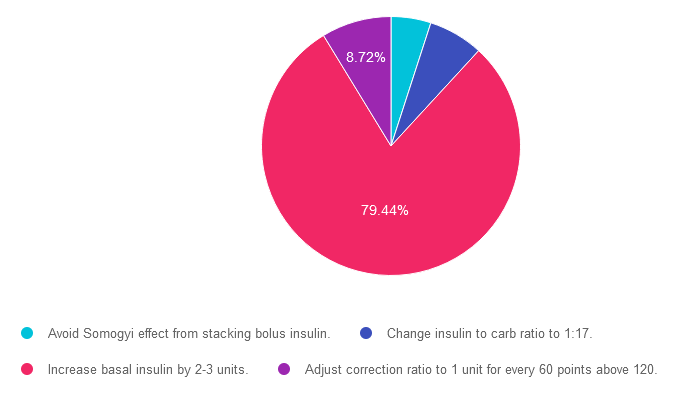
For last week’s practice question, we review how to help improve time in range. 79% of respondents chose the best answer which is awesome. We want to clarify and share this important information, so you can pass it on to people living with diabetes and your colleagues, plus prepare for exam success!
Before we start though, if you don’t want any spoilers and haven’t tried the question yet, you can answer it below: Answer Question
Question: TR is 25 and has new type 1 diabetes and is hoping to get on an insulin pump soon. TR weighs 70 kgs and takes 8 units basal insulin at bedtime, plus takes 1 unit bolus insulin for every 15 gms of carbohydrate and their correction for hyperglycemia is 1 unit for every 50 points above 120. When looking at TR’s ambulatory glucose profile, their time in range is 32% with 67% above range and about ~1% below range. Glucose levels tend to increase starting with dinner at 5pm and stay elevated throughout the night.
Based on this information, what change(s) could help improve time in range?
Answer Choices:
- Avoid Somogyi effect from stacking bolus insulin.
- Change insulin to carb ratio to 1:17.
- Increase basal insulin by 2-3 units.
- Adjust correction ratio to 1 unit for every 60 points above 120.

Getting to the Best Answer
If you are thinking about taking the certification exam, this practice test question will set you up for success. Test writers anticipate possible answers based on the details in the question. They will wave those “juicy answers” right under your nose. Your job is to weed through the particulars, pluck out the most important elements and choose the BEST answer.
Answer 1 is incorrect. 4.98% chose this answer. “Avoid Somogyi effect from stacking bolus insulin.” Somogyi is when blood sugars drop and the counter-regulatory system releases hormones that can dramatically increase blood sugar levels (sometimes referred to as rebound hyperglycemia). Since TR’s glucose levels tend to increase starting with dinner at 5pm and stay elevated throughout the night, they are not experiencing the hypoglycemia associated with the Somogyi effect.
Answer 2 is incorrect. 6.85% of you chose this answer. “Change insulin to carb ratio to 1:17.” Since TR’s glucose levels tend to increase starting with dinner at 5pm and stay elevated throughout the night, this is not due to post meal hyperglycemia. Overnight hyperglycemia is usually connected to inadequate basal insulin dosing.
Answer 3 is correct. About 79.44% of respondents chose this. “Increase basal insulin by 2-3 units.” YES, GREAT JOB! Since TR’s glucose levels tend to increase starting with dinner at 5pm and stay elevated throughout the night, this is an indication that TR has inadequate basal insulin dosing.
Finally, Answer 4 is incorrect. 8.72% chose this answer. “Adjust correction ratio to 1 unit for every 60 points above 120.” Since TR’s glucose levels tend to increase starting with dinner at 5pm and stay elevated throughout the night, this is not due to post meal hyperglycemia or inadequate bolus insulin correction coverage. Overnight hyperglycemia is usually connected to inadequate basal insulin dosing.
We hope you appreciate this week’s rationale! Thank you so much for taking the time to answer our Question of the Week and participate in this fun learning activity!
Want to learn more about this question?
NEW: Diabetes Technology Data Toolkit: Hands-on Data Interpretation Workshop with Dr. Diana Isaacs
Join Diana Isaacs live on August 30th, 2023, at 11:30 am PST
As diabetes technology is becoming commonplace in our practice, figuring out how to make sense of all the data can seem overwhelming. Dr. Isaacs has a special knack for breaking down the essential elements of the Ambulatory Glucose Profile (AGP) and other reports to provide participants with a clear road map for data interpretation. She includes tons of sample practice cases utilizing CGM, connected pens, and insulin pumps.
By attending this interactive workshop, participants will become more confident in interpreting the AGP and continuous glucose monitor (CGM) data and determining needed medication and lifestyle adjustments.
Topics include:
- Learn how to review the ambulatory glucose profile (AGP) report systematically and efficiently.
- Understand the key metrics of CGM Data and person-centered goals.
- Utilize CGM and connected data to make medication adjustments and lifestyle/behavior recommendations.
- Apply data interpretation principles to a wide variety of cases in people with type 1 and type 2 diabetes.
Instructor: Diana Isaacs, PharmD, BCPS, BCACP, CDCES, BC-ADM, FADCES, FCCPCES, was awarded ADCES Diabetes Care and Educational Specialist of the Year for her educational platform promoting the use of CGM for people with diabetes and other innovations. She is the Director of Education & Training in Diabetes Technology at the Cleveland Clinic. She has numerous diabetes publications and research projects focusing on medications, CGM, and diabetes technology. You won’t want to miss this hands-on workshop with an international expert in the field.
All hours earned count toward your CDCES Accreditation Information
Sign up for Diabetes Blog Bytes – we post one daily Blog Byte from Monday to Friday. And of course, Tuesday is our Question of the Week. It’s Informative and FREE! Sign up below!
The use of DES products does not guarantee the successful passage of the CDCES exam. CBDCE does not endorse any preparatory or review materials for the CDCES exam, except for those published by CBDCE.









